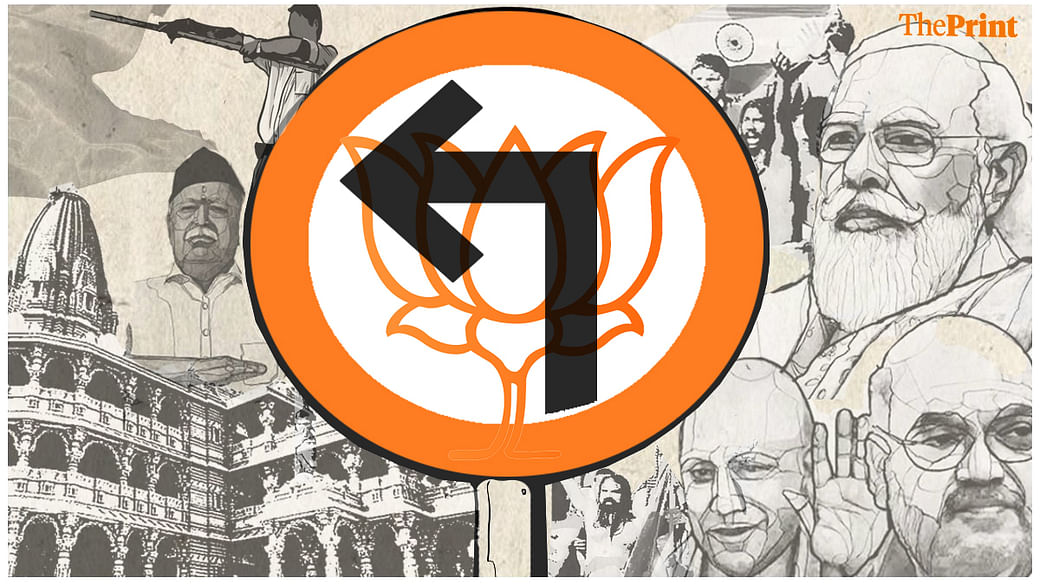Modi-Shah BJP government is Right only on religion and nationalism. The rest is as Left as the Congress or any other.writes SHEKHAR GUPTA in The Print

Prashant Kishor, who prefers to be described as a political aide rather than a strategist, which is generally the preferred usage for him, featured in our serious conversational show ‘Off The Cuff’ this week. Neelam Pandey, a senior member of our political reporting team at ThePrint, co-hosted it with me.
At some point, we asked him the question that’s always intrigued us. Does he have an ideology? Doesn’t that follow from the fact that he’s worked with Narendra Modi, Mamata Banerjee, Congress-SP (Uttar Pradesh, 2017), M.K. Stalin, Y.S. Jagan Mohan Reddy, Amarinder Singh and more?
To our surprise, he said no, I am not ideology-agnostic, you can call me Left-of-Centre. And then went on to elaborate what he meant, by using Mahatma Gandhi’s example. And so on. I noticed later, incidentally, that Kishor’s Twitter bio begins with the words “Revere Gandhi…”
His claim to a Centre-Left ideology set us thinking. What if we asked any of the other key political leaders the same question today? What is your ideology? Rahul and Priyanka Gandhi, Mamata Banerjee, Andhra’s Jagan, Tamil Nadu’s Stalin, Telangana’s KCR and so on. If any of them chooses to answer that question — the answer, honest or not, will be about the same. Everyone in Indian politics now wades in the waters of varying depth somewhere on the Left side of the pool. Nobody will say I stand on the Right.
Which brings us to the trick question. What would Narendra Modi’s answer be? We are, of course, making a brave and far-out presumption that he lets us or anyone ask him such a direct question: What’s your ideology, Prime Minister sir? Now, whether you are fan or a critic, chances are, your immediate response will be, of course the Right wing.
Over the past seven years since the Modi-Shah BJP has been in power, “Right wing” has become the widely accepted usage for the party, and the ideological forces behind it. We need to examine if this passes the test of facts. And fasten seat belts. Because, I will then make the case to you that what Modi and his BJP represent today is not a domineering national force of the Hindu Right. It is, on the other hand, the Hindu Left.
The Left-Right descriptors over time have become mixed up and confusing. In governance terms, the Right means first of all, social conservatism, strong religiosity, hard nationalism, low threshold for criticism, an authoritarian outlook. On all these parameters, the Modi government and today’s BJP pass the test of being Right wing. The reason I qualify it here is that we do not get caught in simplistic binaries. On all of these, this BJP and Modi are no different from, say, the Republicans in the US or the British Conservatives. Then, we enter contentious zones.
How do we, then come to our argument that the Modi-Shah-Yogi BJP is not a force of the pure Right or even the Hindu Right, but of the Hindu Left?
Check out the many steps the Modi government has taken on the economy in the past seven-plus years. For historical reference, look back at the previous BJP government under Atal Bihari Vajpayee. It made its commitment to getting the government out of business explicit, and set up a disinvestment ministry. When the party returned to power in 2014, you would have expected it to bring that ministry back. No such thing happened, although now there is a department, DIPAM, in the finance ministry with a full secretary.
It is only now that there is heady talk of disinvestment, but not so much has happened yet, with the sterling exception of Air India. Much other privatisation is still merely talk, or sleight of hand. As in, getting one public sector giant to acquire a smaller one, and the government, as the majority shareholder, cashing out to balance its deficit. But it is, as we had said in an earlier National Interest, like genius Milo Minderbender of Joseph Heller’s Catch-22 trading with himself and making a profit. Of course, using the state’s products and cash.
Actually, this gets worse than a sleight of hand often enough. Think of the LIC, or even ONGC, being made to buy another PSU the government wants to ‘disinvest’ from. A bunch of money is paid out to the government. Our complaint isn’t that it disappears into that bottomless pit called the Consolidated Fund of India. If you believed in a market economy, you would have no complaint if the LIC or ONGC paid out dividends from its profits to its only, or overwhelming, shareholder, the government. But when the government makes them buy assets from it, these companies are not necessarily acting in the best interests of the policy holder or the minority shareholder. We are not saying that it always works out to their detriment, but the fact is these are not decisions these companies’ boards are taking with these non-sarkari shareholders’ interests at the top of their minds. This is a characteristic of the Left, not Right.
The Left is also known for handout economics, large, ambitious, welfare schemes involving redistribution of large chunks of the revenues. Which is precisely what the Modi government has been doing, from the MGNREGA it inherited to Gram Awas, toilet-building, Ujjwala, direct cash transfers to farmers and the poor, free grain and so on. Have you noticed, in fact, how muted as the opposition criticism of this governments’ Budgets has been?
There is some usual sniggering about being “pro-rich” etc. But everybody also notices that taxes on individuals now are the highest — almost 44 per cent — since reform began. Add to that an average of 18 per cent or so GST on goods and services that people, especially the rich, consume. The Left would applaud this. Of course, they’d want this to be even higher. Hopefully not the 97 per cent it was at Indira Gandhi’s socialist peak, when the foundation of the parallel black economy was laid.
An expanding, large, maai-baap (mom & dad) sarkar is something the Leftists love. See the expansion of our government in the Modi era. More and more Bhawans have come up in Delhi to accommodate a burgeoning government. Now the new Central Vista will create space for more. A comparison again with Vajpayee government. He had no hesitation selling the loss-making Lodhi Hotel in the heart of Delhi. An even bigger PSU dud was Hotel Janpath. Which, instead of being sold, has now become another set of offices and government accommodation. Samrat Hotel, next to Ashoka, ceased to be a hotel a long time ago. It has become a sarkari bhawan too. In fact, almost everyone here will be surprised when I tell you that even the new Lok Pal (do you remember we had appointed one? Okay, what’s his name?) has been given half a floor here.
Our taxes are higher than in a generation, our government is bigger than two generations and still growing, we ‘privatise’ our companies often by selling one PSU to another, now our government also decides for all of the country which Covid vaccine to have when, to be allowed boosters or not, and what can be sold in India. In a genuinely free market, there will be shops and buyers for Covaxin, Covishield, Sputnik, Pfizer and Moderna.
As with cars, consumers can choose a Maruti or a Mercedes. But not vaccines. Why? Because ours is a maai-baap sarkar. It is in no way a government of the economic Right. The Right is limited to religion and nationalism. The rest is as Left as the Congress or any other. The reason we call Modi-BJP ideology as the Hindu Left.

Prashant Kishor, who prefers to be described as a political aide rather than a strategist, which is generally the preferred usage for him, featured in our serious conversational show ‘Off The Cuff’ this week. Neelam Pandey, a senior member of our political reporting team at ThePrint, co-hosted it with me.
At some point, we asked him the question that’s always intrigued us. Does he have an ideology? Doesn’t that follow from the fact that he’s worked with Narendra Modi, Mamata Banerjee, Congress-SP (Uttar Pradesh, 2017), M.K. Stalin, Y.S. Jagan Mohan Reddy, Amarinder Singh and more?
To our surprise, he said no, I am not ideology-agnostic, you can call me Left-of-Centre. And then went on to elaborate what he meant, by using Mahatma Gandhi’s example. And so on. I noticed later, incidentally, that Kishor’s Twitter bio begins with the words “Revere Gandhi…”
His claim to a Centre-Left ideology set us thinking. What if we asked any of the other key political leaders the same question today? What is your ideology? Rahul and Priyanka Gandhi, Mamata Banerjee, Andhra’s Jagan, Tamil Nadu’s Stalin, Telangana’s KCR and so on. If any of them chooses to answer that question — the answer, honest or not, will be about the same. Everyone in Indian politics now wades in the waters of varying depth somewhere on the Left side of the pool. Nobody will say I stand on the Right.
Which brings us to the trick question. What would Narendra Modi’s answer be? We are, of course, making a brave and far-out presumption that he lets us or anyone ask him such a direct question: What’s your ideology, Prime Minister sir? Now, whether you are fan or a critic, chances are, your immediate response will be, of course the Right wing.
Over the past seven years since the Modi-Shah BJP has been in power, “Right wing” has become the widely accepted usage for the party, and the ideological forces behind it. We need to examine if this passes the test of facts. And fasten seat belts. Because, I will then make the case to you that what Modi and his BJP represent today is not a domineering national force of the Hindu Right. It is, on the other hand, the Hindu Left.
The Left-Right descriptors over time have become mixed up and confusing. In governance terms, the Right means first of all, social conservatism, strong religiosity, hard nationalism, low threshold for criticism, an authoritarian outlook. On all these parameters, the Modi government and today’s BJP pass the test of being Right wing. The reason I qualify it here is that we do not get caught in simplistic binaries. On all of these, this BJP and Modi are no different from, say, the Republicans in the US or the British Conservatives. Then, we enter contentious zones.
How do we, then come to our argument that the Modi-Shah-Yogi BJP is not a force of the pure Right or even the Hindu Right, but of the Hindu Left?
Check out the many steps the Modi government has taken on the economy in the past seven-plus years. For historical reference, look back at the previous BJP government under Atal Bihari Vajpayee. It made its commitment to getting the government out of business explicit, and set up a disinvestment ministry. When the party returned to power in 2014, you would have expected it to bring that ministry back. No such thing happened, although now there is a department, DIPAM, in the finance ministry with a full secretary.
It is only now that there is heady talk of disinvestment, but not so much has happened yet, with the sterling exception of Air India. Much other privatisation is still merely talk, or sleight of hand. As in, getting one public sector giant to acquire a smaller one, and the government, as the majority shareholder, cashing out to balance its deficit. But it is, as we had said in an earlier National Interest, like genius Milo Minderbender of Joseph Heller’s Catch-22 trading with himself and making a profit. Of course, using the state’s products and cash.
Actually, this gets worse than a sleight of hand often enough. Think of the LIC, or even ONGC, being made to buy another PSU the government wants to ‘disinvest’ from. A bunch of money is paid out to the government. Our complaint isn’t that it disappears into that bottomless pit called the Consolidated Fund of India. If you believed in a market economy, you would have no complaint if the LIC or ONGC paid out dividends from its profits to its only, or overwhelming, shareholder, the government. But when the government makes them buy assets from it, these companies are not necessarily acting in the best interests of the policy holder or the minority shareholder. We are not saying that it always works out to their detriment, but the fact is these are not decisions these companies’ boards are taking with these non-sarkari shareholders’ interests at the top of their minds. This is a characteristic of the Left, not Right.
The Left is also known for handout economics, large, ambitious, welfare schemes involving redistribution of large chunks of the revenues. Which is precisely what the Modi government has been doing, from the MGNREGA it inherited to Gram Awas, toilet-building, Ujjwala, direct cash transfers to farmers and the poor, free grain and so on. Have you noticed, in fact, how muted as the opposition criticism of this governments’ Budgets has been?
There is some usual sniggering about being “pro-rich” etc. But everybody also notices that taxes on individuals now are the highest — almost 44 per cent — since reform began. Add to that an average of 18 per cent or so GST on goods and services that people, especially the rich, consume. The Left would applaud this. Of course, they’d want this to be even higher. Hopefully not the 97 per cent it was at Indira Gandhi’s socialist peak, when the foundation of the parallel black economy was laid.
An expanding, large, maai-baap (mom & dad) sarkar is something the Leftists love. See the expansion of our government in the Modi era. More and more Bhawans have come up in Delhi to accommodate a burgeoning government. Now the new Central Vista will create space for more. A comparison again with Vajpayee government. He had no hesitation selling the loss-making Lodhi Hotel in the heart of Delhi. An even bigger PSU dud was Hotel Janpath. Which, instead of being sold, has now become another set of offices and government accommodation. Samrat Hotel, next to Ashoka, ceased to be a hotel a long time ago. It has become a sarkari bhawan too. In fact, almost everyone here will be surprised when I tell you that even the new Lok Pal (do you remember we had appointed one? Okay, what’s his name?) has been given half a floor here.
Our taxes are higher than in a generation, our government is bigger than two generations and still growing, we ‘privatise’ our companies often by selling one PSU to another, now our government also decides for all of the country which Covid vaccine to have when, to be allowed boosters or not, and what can be sold in India. In a genuinely free market, there will be shops and buyers for Covaxin, Covishield, Sputnik, Pfizer and Moderna.
As with cars, consumers can choose a Maruti or a Mercedes. But not vaccines. Why? Because ours is a maai-baap sarkar. It is in no way a government of the economic Right. The Right is limited to religion and nationalism. The rest is as Left as the Congress or any other. The reason we call Modi-BJP ideology as the Hindu Left.

